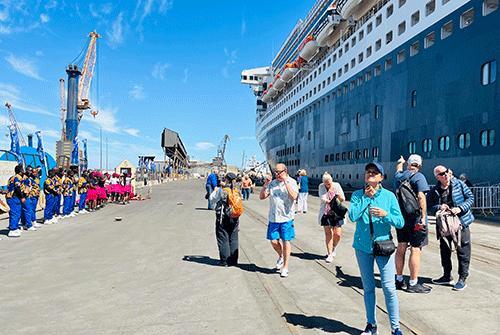Africa-Press – Namibia. Namibia needs to up its game and streamline the immigration process of passengers to ensure an efficient process that will allow tour operators and entrepreneurs to capitalise on tourists arriving on cruise liners.
This observation was made by the executive director of the tourism ministry, Teofilus Nghitila, after he witnessed first-hand the processing of passports and visas on Monday with the arrival of one of the largest cruise ships, Queen Mary II.
On Monday, the passenger liner, triple the size of the Titanic, docked at the port of Walvis Bay around 11h30 with over 3 400 people. Of those, 2 000 were passengers and 1 400 were crew members. Over 1 000 people had to be cleared in order to embark on their one-day visit.
A further 44 cruise liners are expected to dock in the coming months. However, the process did not live up to the expectations of Nghitila, as it was slow.
The process dragged on for quite some time, as there was not enough manpower to deal with the large number.
Ironically, tour operators last year urged the ministry of home affairs to deploy more officials, or explore the possibility of exempting tourists arriving on cruise ships from face-to-face or physical inspections.
Local tourism operators stated that they are losing out on lucrative revenue due to delays in immigration services offered to tourists on board cruise liners.
“We really need to work hard and improve our processes so that we introduce some efficiencies in the way we are processing our visas for the port, as this is an opportunity that we cannot miss as a country. Therefore, the quicker we process, the faster people disembark and the more money they spend,” the executive director said.
Nghitila observed that processing the passports and visas faster would eliminate long queues, and encourage more people to explore the coastal towns. At the current trend, locals will miss out as tourists will not have enough time to take part in activities.
“I came here to experience this, and will consult with my counterpart so that we can see how quickly we can get as many passengers as possible out of the ship so that they can visit our country, and they spend more money and more time,” he added.
“This is really a niche market that we need to explore,” he said. “This is a huge market, and we must capitalise on it.”
In September last year, 42 passenger liners carrying an average of 2 000 tourists docked during the same time when immigration officials cleared 26 353 guests upon arrival, and over 39 000 upon departure from passenger liners docking and departing from Lüderitz and Walvis Bay.
According to tour operators, the shortage of manpower and the absence of visa-on-arrival services at the port not only lead to unnecessary delays, but also impede the industry from fully capitalising on the revenue potential offered by passenger liner services.
Operators highlighted that the lack of personnel could cause delays of up to eight hours during the clearing process.
Operator Boeta Mouton explained that during the recent arrival of Queen Mary II last year, only four officers were available to process over 2 000 passengers who disembarked from the cruise
liner.
“This resulted in an eight-hour delay, and some of us had to refund passengers because they were unable to participate in the activities they had booked for their one-day stay. This revenue stream is lucrative, and we need to improve our approach to receive better reviews and attract more cruise liners, rather than losing money,” Mouton stated.
Earlier this month, home affairs minister Albert Kawana said they are aware of the increasing number of cruise ships that are docking at the ports of Luderitz and Walvis Bay.
According to him, they consult with Namport on the arrival of these cruise ships so that they can divert additional manpower to the ports. “These cruise ships will be coming until the end of May, and we will make use of the system, as employing people in these positions is crucial. However, those who will accept these positions need to be vetted, and that will take time,” Kawana stated.
For More News And Analysis About Namibia Follow Africa-Press






